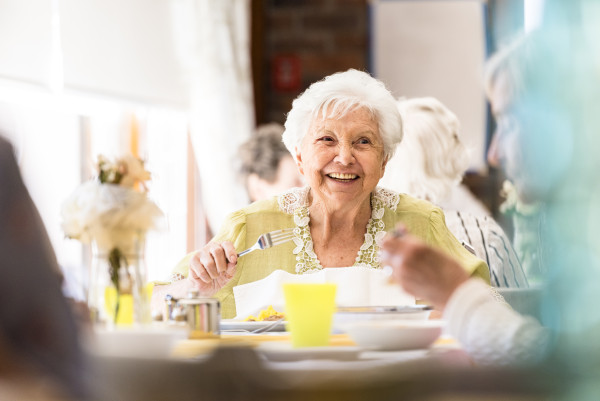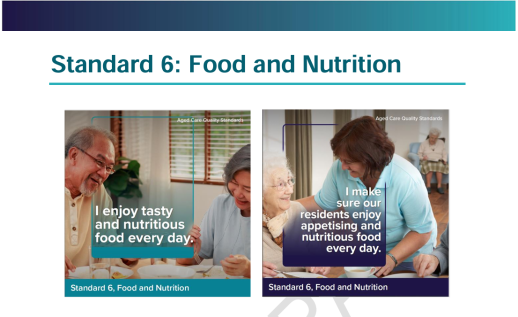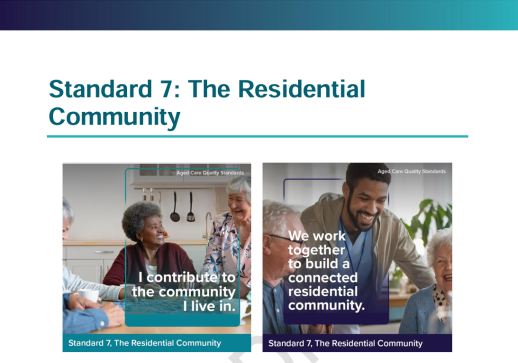The alignment between Higher Everyday Living Fees (HELF) and Strengthened Quality Standards 6 and 7

We’ve explored in two previous insights how Additional Services (AS) programs and the transition to Higher Everyday Living Fees (HELF) align with Strengthened Quality Standards 1, 2, 3, and 4.
In this third and final insight, we focus on how the transition to HELF aligns with food, drink, dining experiences, and lifestyle activities under Standards 6 and 7.
The aged care sector is transforming with the introduction of the Strengthened Quality Standards and HELF, emphasising a person-centred model to enhance residents' quality of life. Key areas like dining and lifestyle activities contribute to physical well-being, social connection, and emotional fulfilment.
HELF enables providers to innovate and go beyond meeting basic accreditation requirements, creating personalised experiences that reflect residents' preferences and foster engagement. By leveraging these programs, providers can create enriched, personalised experiences that reflect residents' preferences, foster engagement, and promote a sense of dignity and autonomy.
This article examines how HELF aligns with Standards 6 and 7, offering practical insights on integrating resident feedback, enhancing choice, and delivering innovative options that meet and exceed foundational standards, improving satisfaction and achieving sustainable outcomes.
Standard 6: Food and Nutrition

- See Standard 6 on page 36-39
Complaints about food and catering consistently rank among the top five received by the Quality Commission, highlighting the vital role of dining experiences in residents' lives. Standard 6 addresses not only food service and nutrition management but also the cultural, social, and emotional importance of food, considering factors like appetite, sensory decline, and overall well-being.
‘Partnering’ with residents involves listening to and acting on their views about food and nutrition. This includes involving them in menu planning, creating inviting dining environments, ensuring appealing food presentation, and addressing feedback.
One of the challenges with HELF and Standard 6 is managing the stakeholder consistency of understanding of what is the basic level of service required by Government funding and Standard 6 and what is considered significantly better as part of a HELF program. Whilst the resident is central to this understanding, it extends to all stakeholders including dieticians, catering and care teams and those responsible for monitoring compliance.
Consumer Choice and HELF
HELF programs can elevate dining and hospitality services, aligning them with Standard 6. However, designing and delivering HELF services requires careful consultation to balance accreditation requirements and HELF offerings.
Incorporating resident input into dining options enhances satisfaction and perceived value. While menus must meet basic standards—such as offering variety and reflecting resident preferences—HELF programs can introduce additional choices and a higher standard of service to differentiate facilities and improve financial viability. A well-designed HELF program also requires robust monitoring systems to track feedback and ensure continuous improvement.
Understanding Basic Standards vs. HELF Enhancements
The Basic Daily Fee and Hotelling Supplement meet minimum standards for food and dining services as required for accreditation. HELF programs go beyond these basics, offering enhanced options shaped by resident feedback to create superior dining experiences.
Examples of HELF enhancements include:
- Expanded menu options
- Premium ingredients and dishes
- Intimate dining with table linens and napkins
- A wider range of beverages, such as soft drinks or wine
These enhancements enrich dining experiences and emphasise resident choice, a core aspect of person-centred care.
Innovative HELF Programs
To stand out, HELF programs can incorporate creative dining experiences, such as:
- Themed meal nights (e.g., cultural cuisines or fine dining)
- Barista-quality coffee, specialty teas, or fresh-pressed juices
- Snack menus with artisanal or gourmet options
- Restaurant-style meal presentation for enhanced dignity and appeal
- Tasting sessions to engage residents in menu selection
HELF programs can also promote social dining, fostering community and connection. Premium visitor packages, private dining spaces, and outdoor meal settings enhance inclusivity, dignity, and autonomy.
The Role of Staff and Continuous Improvement
Staff play a vital role in delivering, monitoring, and enhancing dining services. Providers should address knowledge gaps to ensure all team members understand the distinction between basic services and HELF enhancements. Clear communication and training can help align services with accreditation requirements while fostering innovation and excellence.
Conclusion
HELF programs offer opportunities to exceed basic standards by integrating resident preferences, fostering social engagement, and promoting wellness. By leveraging feedback and embracing innovation, providers can create dining experiences that elevate residents’ quality of life and set their facilities apart.
Standard 7: The Residential Community

- See Standard 7 on page 40-42
Under Standard 7, activities will undergo changes to align with strengthened requirements and the Aged Care Rules, which prioritise face-to-face interaction and at least one social activity per day, including weekends and public holidays. Standard 7.1.1 supports residents in pursuing activities they value, whether through lifestyle programs, maintaining relationships, or community involvement.
To meet these expectations, providers must move beyond fixed activities and create environments shaped by residents' preferences. This involves:
- Personalised activity plans based on residents' interests and goals
- Flexible scheduling to ensure voluntary, meaningful participation
- Opportunities for leadership, allowing residents to influence or lead activities, fostering autonomy and purpose
The Role of HELF Programs
The strengthened standards and proposed Aged Care Rules provide clear guidance on recreational and social activity expectations. A common area of confusion involves bus trips and community outings. While outings are a required part of care, the Aged Care Rules clarify that costs related to entry tickets, transport, or purchased food and beverages during outings are not covered by government funding:
HELF programs offer aged care providers an opportunity to expand their activity offerings beyond these basic requirements. With HELF funding, facilities can introduce diverse and higher-quality activity options tailored to resident preferences. Examples include:
- Specialised programs based on residents’ hobbies (e.g., gardening, music, arts and crafts)
- Community engagement initiatives (e.g., club memberships)
- Social dining or cooking events, fostering inclusion and shared experiences
By leveraging HELF programs, facilities can meet the heightened expectations of Standard 7 while offering meaningful, engaging activities that reflect individual desires. These enhancements not only meet regulatory requirements but also improve residents' quality of life by promoting choice, connection, and fulfilment.
The Transition Pathway to HELF
A successful HELF program will include seven (7) essential elements:
- Transparency
- Clarity and simplicity
- Dedicated and trained customer support teams
- Equitable value base pricing
- Independent quality assurance
- Relevant inclusions
- Robust and open feedback mechanisms
It’s been a pleasure working alongside providers to implement Additional Services in over 25,000 beds over the past 6 years, and our team looks forward to continuing our support as you transition to HELF by 1 July 2025.
We offer core services tailored to help you transition effectively:
- AS to HELF Transition Program
- AS Program Audit
- HELF Implementation and Ongoing Support
Our HELF services are designed to streamline your journey, ensure compliance, and position your organisation for success under the new regulations.
We’ve also developed the HELF Readiness Portal as a first step. Subscribing to this portal will provide you up-to-date information and tools to help you understand the impact of HELF on your organisation and support your readiness for 1 July 2025.
See HELF Readiness Portal
To find out how we can assist your organisation with Additional Services and Higher Everyday Living Fees, contact Megan.
Megan White
02 9068 0777
megan.white@prideagedliving.com.au

